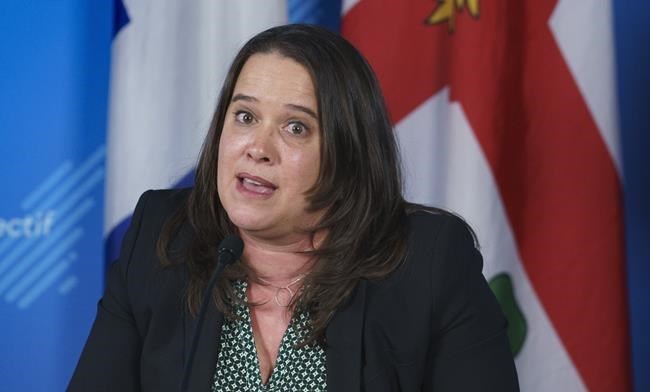MONTREAL — Controlling monkeypox will be done through vaccination, not by encouraging men who have sex with men to limit their sexual partners, Montreal's public health director said Thursday.
"If my objective is to control an outbreak of this size, I believe the vaccine is a much more effective tool, and that's why my main message today is to encourage the community, the people for whom (the vaccine) is recommended, to go out and get it," Dr. Mylène Drouin told reporters. "I don't think that we're necessarily going to control the outbreak with a message that's only related to certain behaviours."
Her message differs from the one issued Wednesday by Canada's chief public health officer, Dr. Theresa Tam, who recommended that men who have sex with men limit their number of sexual partners and practise safe sex.
Drouin said that while she is encouraging people to use the safe sex practices that they normally use for preventing other sexually transmitted infections, her office is focused on encouraging vaccination and giving people the information that they need to make their own choices.
Alexandre Dumont Blais, the executive director of RÉZO, a Montreal non-profit that works to promote the health of gay and bisexual men, said he thinks institutions shouldn't tell LGBTQ people what to do.Â
"What works is giving the information and letting people decide for themselves about what is the best strategy for themselves," he told reporters at the same news conference.
Drouin's call for people to get vaccinated comes four days before the beginning of Montreal Pride, but she said she doesn't think the festival itself will necessarily lead to a rise in monkeypox cases in the city. Instead, she said, she expects the increase in travel and contacts throughout the summer to lead to a rise in cases.Â
The disease, which spreads through close contacts, including sexual contacts, has primarily affected men who have sex with men and while Drouin said it is not spreading outside of that community in Montreal, it could.Â
"We have to understand that monkeypox, it's not a sexually transmitted disease," she said. It's now spreading in the community of gay, bisexual, trans and other men who have sex with men because of "interconnections in certain groups within the community," she added. "But I think we have to see this disease as not only linked to a specific community."
There have been 299 confirmed cases of monkeypox in Montreal and six people have been hospitalized.
While most cases have not required hospitalization, Drouin said painful lesions can last from two to four weeks and with people asked to isolate until their lesions disappear, that period can be difficult, as people are cut off from social activities.Â
"It has an impact on mental health. It is painful," she said.Â
Drouin says the outbreak appears to have plateaued in Montreal, but with the disease still spreading in other countries, she said she is not optimistic it will be eliminated in the city.
"In the United States, in other jurisdictions, even Ontario, in European countries, we're seeing a rapid increase in the number of cases right now, so we have to be vigilant," she said.Â
Drouin said more than 13,000 people have been vaccinated against the disease and the vaccination campaign hopes to reach between 20,000 and 25,000 people. Quebec has received 40,000 doses of vaccine, she added.
With the supply of vaccine limited, Drouin said Quebec's strategy remains to give as many people as possible a single dose, in an effort to control the outbreak.
While two doses of the vaccine are normally administered, Quebec's immunization committee has said studies show a single dose is effective.
Drouin said that the strategy could change if public health sees a rise in the number of cases among vaccinated individuals.Â
This report by The Canadian Press was first published July 28, 2022.
Jacob Serebrin, The Canadian Press




